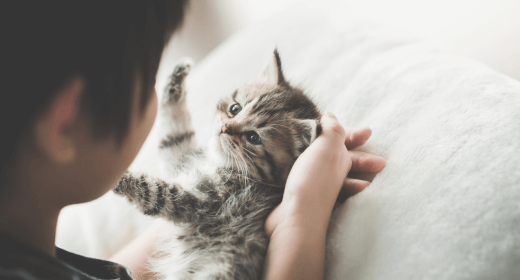

While keeping kittens indoors has significant benefits, protecting them from a large number of dangers, it does require you to pay attention to the provision of enrichment opportunities. While kittens spend a great deal of their time sleeping, their periods of wakefulness can and should be used to stimulate psychological and physical activity. The natural predatory/play behavior of kittens is usually easy to stimulate with interactive toys, such as feathers on a string or flicking a laser dot along the floor and walls. One way to defeat the “nighttime crazies” is to have a pet owner engage in active, vigorous play before feeding your kitten at bedtime. This mimics the natural hunting-feeding-grooming-sleeping sequence of cats.
Kittens also can be trained. They will respond quite favorably to clicker training using a high-quality food treat as reinforcement. As with dogs, training sequences can be used to ensure that kittens are getting adequate physical and mental exercise. Many cats also benefit from social activity with other cats, especially if they were introduced to other cats early in life. Cats put a premium on managing space, so it is important that multiple-cat homes offer a variety of places to hide, sleep, and observe, using both the horizontal and vertical dimensions.
A greater challenge is providing enrichment opportunities for dogs and cats when a person or another pet is not present to interact with them. Kittens and cats will spend a great deal of time watching out windows, especially if there is a bird feeder or butterfly garden within view, so make sure to keep at least one window blind open—especially if it looks out to an area with frequent movement and activity.
Providing your kitten with enrichment opportunities helps to prevent stress and the development of abnormal behaviors. These abnormal behaviors, in turn, put a strain on the pet owner and can play a key role in eventual relinquishment. Enrichment also provides a context for physical and psychological exercise that supports the overall well-being of your kitten.


Wheat is a grain used as a high-quality carbohydrate source in dry cat foods. It provides energy for daily activity, as well as processing characteristics for the food. IAMS™ research has shown that including wheat in a complete and balanced diet resulted in a moderate glycemic response in dogs and cats, lower in general than that observed when a rice-based diet was fed.1,2
A common misconception is that feeding wheat causes food allergies. Here are the facts:
1 Sunvold GD. The role of novel nutrients in managing obesity. In: Recent Advances in Canine and Feline Nutrition, Vol II: 1998 IAMS Nutrition Symposium Proceedings. Carey DP, Norton SA, Bolser SM, eds. Wilmington, OH: Orange Frazer Press, 1998; 123-133.
2 Bouchard GF. Effect of dietary carbohydrate source on posprandial plasma glucose and insulin concentration in cats. In: Recent Advances in Canine and Feline Nutrition, Vol III: 2000 IAMS Nutrition Symposium Proceedings. Reinhart GA, Carey DP eds. Wilmington, OH: Orange Frazer Press, 2000; 91-101.